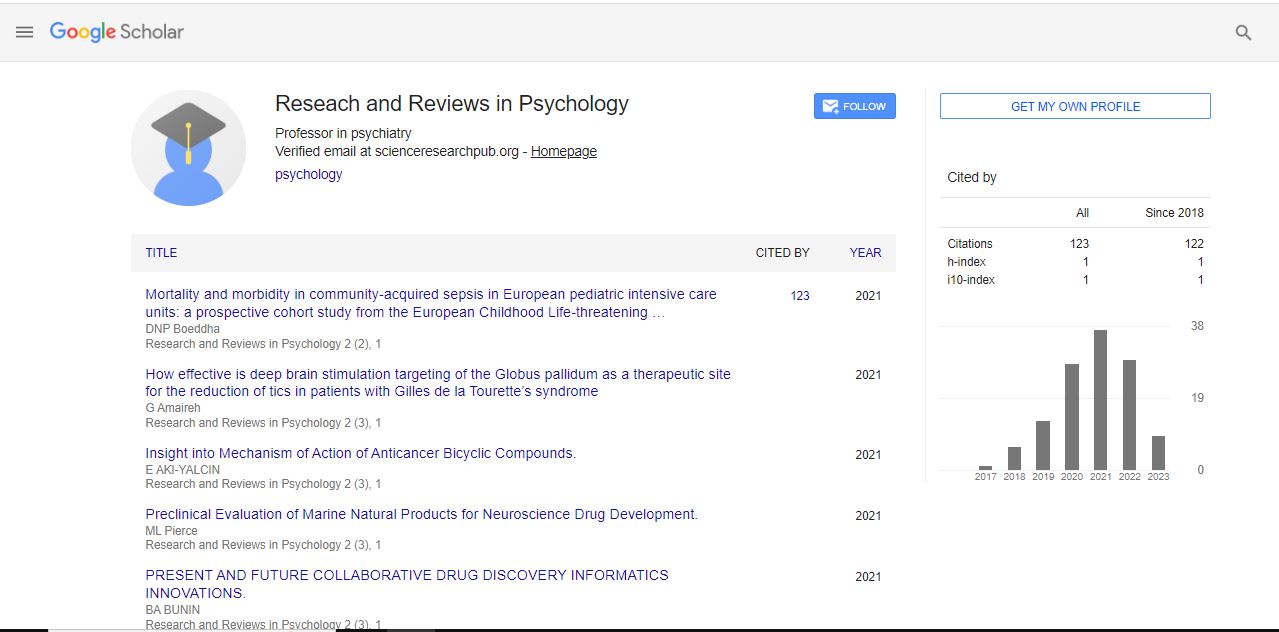Perspective, Res Rev Phys Vol: 4 Issue: 4
Cognitive Neuroscience: Exploring the Mind through Neuropsychology
Dia Emma*
1Department of Trauma and Acute Care Surgery, Michigan State University-College of Human Medicine, Michigan, USA
*Corresponding Author: Dia Emma,
Department of Trauma and Acute Care
Surgery, Michigan State University-College of Human Medicine, Michigan, USA
E-mail: emma.dia@msu.edu
Received date: 28 November, 2023, Manuscript No. RRPY-23-124311;
Editor assigned date: 30 November, 2023, Pre QC No. RRPY-23-124311 (PQ);
Reviewed date: 15 December, 2023, QC No. RRPY-23-124311;
Revised date: 22 December, 2023, Manuscript No. RRPY-23-124311 (R);
Published date: 29 December, 2023, DOI: 10.4182/rrpy.1000354
Citation: Emma D (2023) Cognitive Neuroscience: Exploring the Mind through Neuropsychology. Res Rev Phys 4:4.
Description
Cognitive neuroscience is a multidisciplinary field that delves into the complex relationship between the mind and the brain, seeking to unravel the neural mechanisms underlying cognitive functions. This exploration bridges the realms of psychology and neuroscience, and within the framework of cognitive neuroscience, neuropsychology plays a pivotal role. This article is a journey into the dynamic complex of cognitive processes and neural structures, elucidating how advancements in this field enhance our understanding of the human mind. Cognitive neuroscience is an interdisciplinary domain that investigates the neural basis of mental processes such as perception, attention, memory, language, and decision-making.
It seeks to unravel how the brain's complex networks give rise to cognitive functions, blending insights from psychology, neuroscience, and computational modeling. The roots of cognitive neuroscience trace back to the mid-20th century when researchers began integrating cognitive psychology with emerging neuroscientific techniques. Advances in neuroimaging, brain lesion studies, and electrophysiology have since propelled cognitive neuroscience into a dynamic field that continually reshapes our understanding of cognition. Neuropsychology, a subfield of psychology, focuses on understanding the brain damage or dysfunction affects behavior and cognition. By studying individuals with brain lesions or neurological disorders, neuropsychologists contribute crucial insights to cognitive neuroscience, unraveling the intricacies of brain-behavior relationships. Neuropsychological lesion studies involve examining individuals with specific brain injuries to discern the resulting cognitive deficits. These studies contribute to cognitive mapping, identifying brain regions critical for various functions and unveiling the neural substrates of cognition.
Neuropsychological investigations have elucidated the role of the hippocampus in memory formation. Studies of patients with amnesia, such as those with damage to the hippocampus, underscore the critical involvement of this structure in the encoding and retrieval of declarative memories. Broca's area, a region in the left frontal cortex, has been extensively studied through neuropsychology to understand its role in language production. Patients with Broca's aphasia, resulting from damage to this area, exhibit difficulty in forming grammatically correct sentences while comprehension remains relatively intact. Modern cognitive neuroscience relies on advanced neuroimaging techniques to visualize brain activity. Functional Magnetic Resonance Imaging (fMRI) allows researchers to observe changes in blood flow associated with neural activity, providing insights into the brain regions involved in specific cognitive tasks. Electroencephalography (EEG) measures electrical activity in the brain, and Event-Related Potential (ERP) capture the brain's response to specific stimuli. These tools offer millisecond-level temporal resolution, allowing researchers to investigate the timing and sequence of neural events underlying cognitive processes.
Connect omics explores the structural and functional connectivity of neural networks. Neuropsychological studies, coupled with neuroimaging, contribute to the mapping of brain networks. Understanding these networks is crucial for unraveling how information is processed and integrated across different brain regions. The parallel distributed processing model posits that cognitive processes emerge from the distributed activity of interconnected neural units. Neuropsychological evidence supports this model, demonstrating the damage to specific nodes within a network can selectively impact cognitive functions. Cognitive neuroscience, informed by neuropsychological principles, plays a vital role in neurorehabilitation. Interventions are tailored to capitalize on neural plasticity, promoting recovery in individuals with brain injuries or neurodegenerative disorders. Neuropsychological assessments guide cognitive remediation programs designed to enhance cognitive functions. By targeting specific cognitive deficits observed in individuals with brain disorders, these interventions aim to improve overall cognitive performance.
Cognitive neuroscience faces the ongoing debate between reductionism, emphasizing the understanding of cognition through neural mechanisms, and holism, acknowledging the emergent nature of cognitive functions that cannot be solely explained by isolated neural events. As cognitive neuroscience progresses, ethical considerations surrounding neuro enhancement, mind-reading technologies, and the potential for unintended consequences necessitate careful examination. Neuropsychologists actively contribute to ethical discourse, ensuring responsible applications of cognitive neuroscience findings. Neuromodulation techniques, such as Transcranial Magnetic Stimulation (TMS) and Deep Brain Stimulation (DBS), are emerging as tools to modulate neural activity. Neuropsychological assessments inform the targeted application of these techniques for therapeutic purposes. Advances in Brain-Computer Interfaces (BCIs) aim to establish direct communication between the brain and external devices. Neuropsychology contributes to understanding the feasibility and ethical implications of BCIs, exploring their potential in rehabilitation and augmenting cognitive abilities.
This article encapsulates the synergy between cognitive neuroscience and neuropsychology in unraveling the mysteries of the human mind. From historical foundations to cutting-edge tools, this exploration underscores the collaborative efforts of researchers to decode the neural underpinnings of cognition. The integration of neuropsychological insights enhances our understanding of brainbehavior relationships, informing not only the theoretical landscape of cognitive neuroscience but also guiding practical applications in clinical settings and beyond. As technology and methodologies evolve, the dynamic reciprocation between cognitive neuroscience and neuropsychology continues to illuminate the complex workings of the mind and brain, promising ever-deeper insights into the essence of human cognition.
 Spanish
Spanish  Chinese
Chinese  Russian
Russian  German
German  French
French  Japanese
Japanese  Portuguese
Portuguese  Hindi
Hindi 